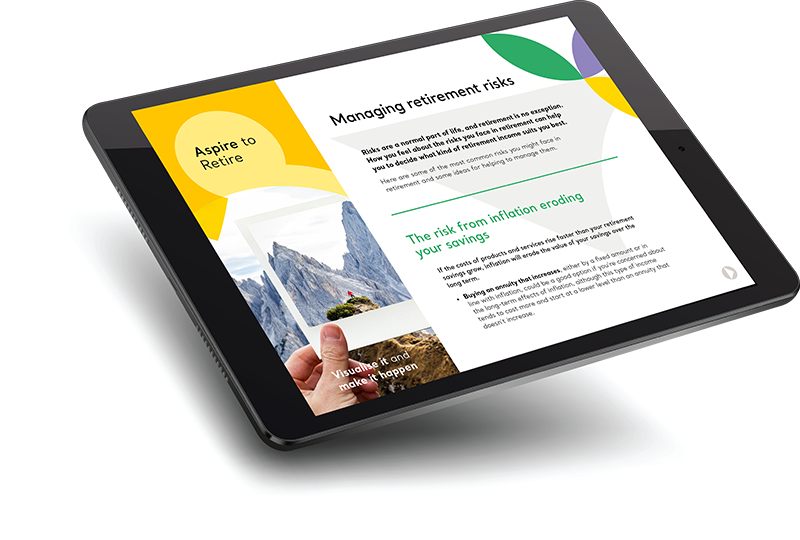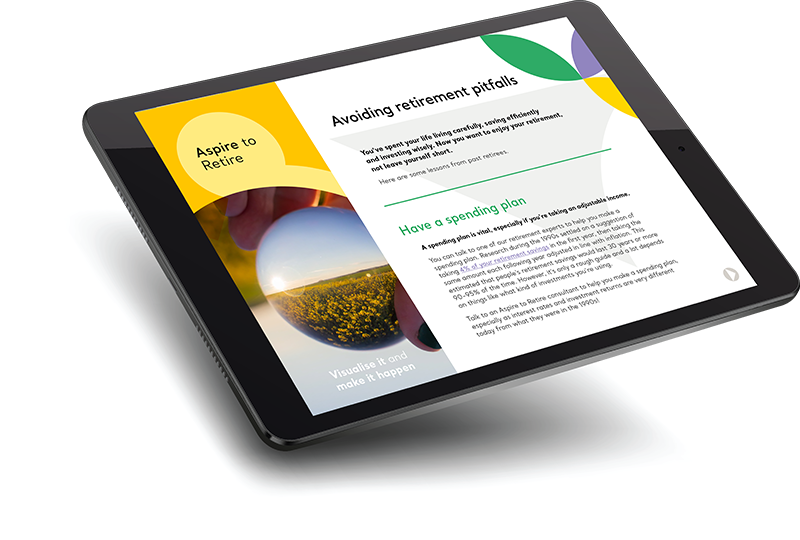
Visualise it, and make it happen

Are you ready to step into the retirement you’ve visualised? Or do you need a little more time to plan, consolidate and build up more savings?
Before you decide
Think about these key considerations
In this section we’ll look at some of the things you need to consider before you take the plunge. If you haven’t read the ‘Understand tax’ section yet, we suggest you read it now so you can take this into consideration too.
Consideration 1 | Timing and affordability

People are generally living longer. Advances in medicine and improved standards of living are the main reasons for extending our old age. People aged 65 years in the UK in 2020-2022 could expect to live on average a further 18.3 years for males, and 20.8 years for females. (Source: Office for National Statistics: Life expectancies). In other words, retirement can easily last 20-25 years or more – so your retirement income needs to go further.
Your spending patterns may change as you age though. You may find that your early retirement years are very active (you may wonder how you ever found time to fit in work!) and your spending may be higher than in later years, when you may go out less and take part in fewer activities. But you need to balance this against the possibility you might need to pay for home help or care.
Do you delay?
Delaying taking your benefits and continuing to save could have the following advantages.
- More contributions from your employer: If you’re in a workplace scheme, it’s likely your employer is contributing to your retirement savings. That’s extra money from your employer! What could a couple more years of that add up to?
- More pension tax relief: When you’re saving for your retirement, you get tax relief on your pension contributions as long as they’re within the allowances – we covered the allowances in ‘Saving in a workplace pension’. This means that, if you pay tax at the basic rate of 20%, for every £40 you put into your pension the government adds another £10 (and you may be able to claim more if you pay tax at a higher rate). Carrying on saving means more tax relief to help your savings grow.
- More investment growth: The longer you save, the more likely your savings are to benefit from investment growth. This isn’t guaranteed, but pension investment strategies are generally designed to give you good returns on your investments over the medium-to-long term. Giving your investments more time to grow might be beneficial.
You can claim your State Pension from your State Pension Age. But did you know you could get a higher State Pension by putting off claiming it? This is known as deferring your State Pension. You don’t have to do anything. Your State Pension will stay deferred until you claim it.
The government website has some estimates of how much extra State Pension you could get by doing this. For example, you could get around £10 more State Pension each week if you:
- reached State Pension age after 6 April 2016
- qualify for the full amount of State Pension, and
- put off claiming your State Pension for a year
However, you need to consider the effect of the ‘missed payments’ if you defer your State Pension. You may be better off in the long term, but worse off in the short term. There is no right answer on this point as it depends on how long you live.
Also remember that you build up State Pension based on your National Insurance record. Your National Insurance record shows the number of years you paid National Insurance contributions or received National Insurance credits (which are paid to carers and people on certain kinds of benefits). Under the current rules you need 35 ‘qualifying’ years of full-rate National Insurance contributions or credits to get the full State Pension, if you don’t have a National Insurance record before April 2016. Could working a few more years mean you get the full State Pension? Check your National Insurance record.

Take action
- Have a look at our countdown checklists to work out how close you really are to retiring.
- Remember to tell your pension provider if you decide to change your retirement age. If you’re in an automatic ‘lifestyle strategy’ or ‘retirement pathway’ investment option, your retirement age drives when your pension savings move into lower-risk investments. If you haven’t updated your retirement age, you could miss out on some growth, although this depends on market conditions. Your retirement age may have been set automatically to 60 or 65 when you started pension saving, so it’s important to check this and change it if you need to.

Consideration 2 | Paying off debt

Imagine going into retirement debt-free. Paying off your debts can be a big step towards the retirement you’ve been dreaming of.
- Could you plan to pay off your mortgage, and any other loans you have, by the time you retire?
- Could you reduce your credit card bills to the point where you pay them off in full each month?
- Do you need help with problem debts?
Check out our plan to pay off debts article for more ideas
Consideration 3 | Consolidation

If you’ve got several pension pots in different places, could you benefit from bringing them together (known as ‘consolidation’)? Here are some of the possible benefits.
- You’d be able to see exactly how much you’ve got in your retirement savings, all in one place rather than having to check multiple plans or accounts.
- It could make managing your pension easier, as you’d only have to deal with one pension provider and pay one lot of charges.
- Modern pension plans often have a wider range of investment options and lower investment charges compared to older pension plans.
- You could have more choice of retirement options with one large pot rather than several smaller ones.
To transfer or not to transfer?
Whether transferring all your pensions into one place is a good idea may depend on what kind of pensions you have.
- If all your pensions are defined contribution (DC), putting them together could give you lower charges and more choice as set out above. But it’s still important to look carefully at each of your DC pensions to make sure consolidation is right for you. To maximise your options, you could consolidate your pensions just before you plan to start taking your benefits. Recent DC pensions (such as auto-enrolment plans) have no penalties for transferring, and don’t have guaranteed benefits, so they tend to be fairly straightforward decisions to make based on comparing charges. Older DC pension plans may have guaranteed investments (such as With Profits) or guaranteed pension terms (such as guaranteed annuity rates), which would be lost if you transferred. Older DC pensions are likely to have higher charges, but also may have a penalty for transferring. You may need an expert opinion if you aren’t sure what type of pension plan you have. See the ‘Getting support’ section for more about financial advice.
- If you have any defined benefit (DB) pensions, you need to think seriously about whether transferring them is a good idea. It may not be. A DB pension promises a guaranteed income for the rest of your life and, in some cases, a guaranteed income for your dependants after you die. Transferring a DB pension to a DC pension pot means giving up these guarantees in return for access to the flexible retirement options available for DC pensions. You’ll need to consider which is most important to you: the certainty of an income, or flexibility. And, unless your DB pension is worth £30,000 or less, you’ll be required to take financial advice before you can transfer it out. See the ‘Getting support’ section for more about financial advice.
You’ll need to decide where to transfer your pensions to. You might be able to transfer them into your current workplace pension, but you’ll need to check whether your workplace scheme can accept the transfer. Or, you could transfer to a personal or stakeholder pension (as long as this doesn’t mean you miss out on contributions from your employer to your workplace pension). We’ve got a useful briefing note on transferring pensions.
We’ve got a useful briefing note on transferring pensions
Consideration 4 | Risks and rewards

We covered the different options for withdrawing your pension benefits. But what are the different risks and rewards?
| Options for withdrawing your pension benefits | Risks | Rewards |
|---|---|---|
| 1. Flexible income ('income drawdown') |
|
|
| 2. Cash |
|
|
| 3. Guaranteed income from an 'annuity' |
|
|

How you feel about these risks can help you decide how to take your retirement income. Knowing the risks means you can manage them better. Read our article on Managing retirement risks.
Read More
Our article on avoiding retirement pitfalls has lots of other useful tips and warnings based on the experience of people who have retired in the past.
Read MoreConsideration 5 | The money purchase annual allowance

If you want to go on saving in a DC pension while taking some of your pension benefits, you need to be aware of the money purchase annual allowance.
For most people, you can save up to 100% of your income into your retirement savings without paying a tax charge, as long as the total amount you and your employer contribute in a tax year is within the annual allowance. This allowance is currently £60,000 a year (but may be lower for higher earners). Starting to take pension benefits from any of your pension plans in some ways – such as flexible income (drawdown) – could reduce this allowance to £10,000 a year. This means saving more than £834 per month could mean a bigger tax bill.
Find out more about – go to our ‘Understand tax’ section.
Consideration 6 | Your wellbeing

You may be ready to retire financially. But are you ready mentally and emotionally?
Retirement doesn’t automatically guarantee a carefree, stress-free life. No longer having your work routine or social contact with colleagues can cause you to feel displaced and lost. Without work to focus on, things you didn’t worry much about previously – like family and health issues – can become overwhelming.
1. Make a plan
It’s as important to make a plan for what you’ll do in your retirement as it is to have a financial plan. If you’ve already visualised your retirement strongly, this shouldn’t be hard. Write down how you intend to spend your days. What will you do? Where will you go? Who will you see? What are your long-term goals – travelling, home and garden improvements, learning?
2. Check expectations
Obviously your retirement is your own, but it can be helpful to know what other people’s expectations are.
- If you have a partner, how well does your mutual vision for retirement line up? For example, has one of you always assumed you’d travel a lot more or move home, while the other one wants to stay put and garden?
- Do other family members assume you’ll be available to look after dependants such as grandchildren, or that you’ll be able to visit them more often?
3. Find a purpose
It may sound like the ultimate retirement cliché. ‘Take up a hobby!’ But many people find having a purpose – hobbies, sports, studying or learning new skills, volunteering – gives them something to focus on, helping to keep other things in life in perspective. It can also be a way to replace social contact you’ve lost by finishing work.















